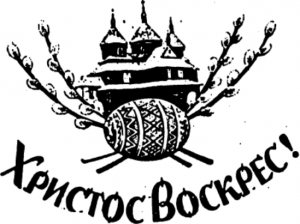The Fathers of our Church tell us that Christ is the measure of all things, both divine and human. Since the divine Ascension, our human nature has been raised up to the right hand of God the Father. In His divine Person, the Son and Word of God was of course always seated on the right hand of the Father, being consubstantial with Him. The divine purpose for the human race, however, is seen in the union of our human nature to the divine Person of Christ, the Second Person of the Holy Trinity, in its being raised to the right hand of the Father.
St. Paul, the great Apostle of the Word of God made flesh, identifies the divine purpose of the Incarnation without adoption as sons of God: But when the fullness of the time was come, God sent forth his Son, made of a woman, made under the law, to redeem them that were under the law, that we might receive the adoption of sons. And because you are sons, God has sent forth the Spirit of his Son into your hearts, crying, Abba, Father. Wherefore you are no more a servant but a son: and if a son, then an heir of God through Christ (Galatians 4: 4-7).
In Christ Jesus we encounter true and perfect God and true and perfect man. In order words, we see in Him not only the great God and Savior, but also what or who we have been called to become – sons and daughters and heirs of God the Father. In fact, the Lord Himself, quoting the Psalmist in response to the Jews’ objection that Jesus was making Himself equal to God, says, Is it not written in your law, I said, You are gods. And St. Paul, pointing to the great mystery of the communion of all the members of the Body of Christ with one another, explains that when one member is glorified, all the members rejoice with it.
St. Irenaeus of Lyons, in refuting the heresy of the Gnostics of the second century, described the divine purpose thus: If the Word is made man, it is that men might become gods. And the champion of Nicaea, Athanasius the Great, who gives us the New Testament canon, reaffirms the Biblical and Irenaean position: God became man that we might be made gods.
What a daring statement! But what exactly does it mean for us to become gods? Can we created mortals become uncreated and immortal? Is this not an impossibility? An impiety? Or even a blasphemy? In what, then, does our becoming gods, our deification or divinization – our theosis – consist?
Since theosis is such an important part of our Eastern spirituality, I will again share more information about this very important idea. Ask yourself,
What does this mean to me?

